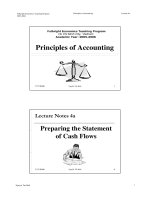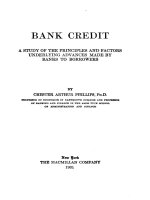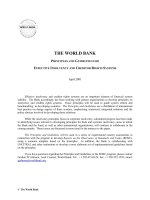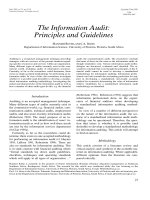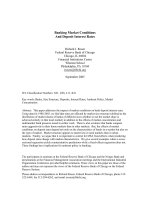banking principles and practice volume 3 domestic banking—cash and deposit operations
Bạn đang xem bản rút gọn của tài liệu. Xem và tải ngay bản đầy đủ của tài liệu tại đây (15.39 MB, 316 trang )
BANKING
PRINCIPLES
AND
PRACTICE
By
RAY B. WESTERFIELD,
Ph.D.
Assistant
Professor of Political Economy,
Yale University;
Secretary-Treasurer, American Economic
Association
IN
FIVE VOLUMES
VOLUME III
DOMESTIC BANKING—
CASH AND
DEPOSIT OPERATIONS
NEW
YORK
THE
RONALD PRESS COMPANY
1921
Copyright,
1921,
by
The
Ronald Press Company
All
Rights Reserved
CONTENTS
VOLUME
III—
DOMESTIC
BANKING—CASH AND
DEPOSIT
OPERATIONS
Chapter
Page
XXVII
Bank
Administration
—
Shareholders
and
Directors
511
The
Management of a Bank
The
Shareholders of National
Banks
Shareholders'
Meetings
Shareholders'
Rights
and
Liabilities
Election of Board
of
Directors
Legal
Qualifications of Directors—
Clayton
Act
Amendments to
Clayton Act
Selection
and
Services of
Directors
Functions
and
Powers
of Boards
of Directors
Limitations
and
Responsibilities
of
Directors
XXVIII Bank
Administration
—
The
Officers . . .
525
The
President—
Powers and
Responsibilities
The
Vice-President
The Cashier
The Powers of Cashier
The
Departmentalization of a
Bank
Methods of
Growth
and
Expansion
Types and
Systems
of
Management
Committee System
An
Illustrative
Organization
The Managerial
Functions
The Executory Functions
XXIX The Paying
Teller
542
General Duties and
Qualifications
Internal Organization
of
Paying
Teller's
Department
Handling
the
Bank's
Cash—
The Money
Department
Payments and Receipts
by Mail and
Express
Payments
at the Clearing House
—
Pay-Rolls
The
Paying Teller's Proof
The Payment of Checks
"Stop-Payment"
Orders
Raised, Postdated, and
Stale Checks
Identification of Presenter
The
Signature
Department
—
Duties and
Organization
Identification
of Signatures
Routine of
Work
Procurement
of Signatory
Authority
IV
CONTENTS
Chapter
Page
Signatory Authority of Corporations
and Partnerships
Account of Deceased Depositors
Trustee's,
Joint,
and
Other
Accounts
Certification
Department
—Function
and Organization
Outstanding
Certified Checks
and
Identification Receipt
System
Precautions in Certifying
Checks
Day Loans and
Overcertification
Certified Checks and Bookkeeper's
Department
XXX The
Receiving Teller
567
General
Duties
and Organization of Receiving Teller's
Department
Opening an
Account and Making
a
Deposit
Nature of
Deposits
and Deposited Items
Handling
Deposited Items
The
Second Teller's
Proof
XXXI The Mail
Teller
576
General
Duties and Organization
of Mail Teller's Depart-
ment
Sorting the Morning Mail
Proving
the Cash Letters
The
Assembly Rack Proof
The Charging and
Distribution of Items
Handling
the
Afternoon
XXXII The Check Desk
Department
589
General Functions and Organization of
the
Check Desk
Department
Sorting
the
Items
Examining the Items
The Proofs
The Ledgers
Routine of
Bookkeepers in Check Desk
Department
Posting the
Exchanges
Method
of
Handling
Overdrafts
and "Holds"
The Balancing of
the Accounts
Other Duties
of the Check Desk
Department
XXXIII
The
Note Teller and City
Collections
Classification
of Items for Collection Purposes
General
Functions of
the
Note
Teller
Handling of
Notes
for Collection
Miscellaneous Collections
Miscellaneous Duties
Bookkeeping and Proofs
Functions
of the
City Collection
Department
Special
Collect
inns
Sight
Draft Collections
604
CONTENTS
Chapter
Page
Returns
Clearing
House Returns
—
Special
Deposits
Cash
Item
Proof
Duties of
the Coupon
Collection Department
Sorting
and
Recording
the Coupons
Collection of
Coupons
and
Departmental Proof
XXXIV
Clearing Houses
626
Definition
of
Clearing House Terms
The
Place of Clearing
and
Its Equipment
Administration
Functions
The
New
York
Clearing House
The
Process
of Clearing
Making
Settlements
Clearing
House
Certificates
Clearing
House Loan
Certificates
General
Purpose
of Loan
Certificates
Settlement
by
Book
Entries with
Federal Reserve Bank
Other
Methods of
Settlement
Items
that May
Be
Cleared
City
Collection
Department
Statistical
Work
Examination
Department
Co-operative
Competition
of Members
XXXV
Country
Collections
651
Transits
and
Collections
Defined
Collections
Through
Correspondent Banks
Exchange
Rates and
Collection Charges
Effect of
Collection
Charges
Country
Clearing
Houses—
Organization
Method
of
Making Country
Collections
Advantages of
Country
Clearing
Houses
Growth of
Country
Clearing
Houses
Nature and
Allocation of
Collection
Charges
Methods of
Handling
Interest
Charges on
Collections
Allocation of
Exchange Charges
Justification
of
Exchange
Charges
Profits
on
Collections
Opposition of
Small
Banks
to Par
Collection
System
Elements of
Collection
Charges
Existing Exchange
Charges
Defects
of the
Former
System of
Country
Collections
XXXVI
The
Federal
Reserve
Collection
System
Growth
of
the System
Transit
Items
Collectible
Under System
Routing and
Clearing
of
Items
Non-Transit
Items
Collectible Under
System
Procedure in
Making
Collections
672
VI
CONTENTS
Chapter
Advantages of
the
Federal Reserve Collection System
Opposition to Federal Reserve Collection System
The Universal
Numerical System
XXXVII The Transit Department
Page
686
General Functions and Organization
of
the
Transit
Department
Collection of Cash
Items
—Work of Night
Force
Collection of Cash Items
—
Work
of Day Force
Collection of Non-Transit Items
The
Analysis of Accounts
Cost
of
Handling an Account
Profit on
Handling
an
Account
Nature of Telegraphic Communications
Telegraphic Payments, Transfers, and Deposits
Cashier's
Checks and Exchange Drafts
Commercial Paper of Correspondents
The
Law of Collections and Acceptance
Responsibility
of
Collecting
Bank as
Agent
Responsibility for Selection of Agent
Restrictive Indorsement of Items
Instructions
for
Collections
Time of Presentment for
Acceptance
or
Payment
Place of Presentment for Acceptance or Payment
Person
to Whom Presentment
for
Acceptance
or Pay-
ment
Is Made
Protest
Acceptable Tender
XXXVIII Special Service Departments
713
Gratuitous Services by Banks
The Customers' Securities
Department
Internal Organization
Records of
Securities Department
Miscellaneous Duties
Relationship
to Other Departments
The Statistical Department
The
Industrial Service
Department
The Foreign
Trade
Department
—The
Commercial Rep-
resentative
Work of Home
Organization
XXXIX Travelers' Checks
and Letter
of
Credit Depart-
Gcneral Duties and Organization of
the Department
Application for Letter
of
Credit
Typical
Letter
of
C
red
it
Identification of Holder of Letter of Credit
Methods and
Terms of Issuance
The Issuance of
Travelers'
Checks
Letters
of
Credit
and
Travelers' Checks Issued by
Inte-
rior
Correspondents
727
CONTENTS
vii
Chapter
Page
Method
of Using
Letters
of Credit
Method
of Using Travelers'
Checks
Letters
of Credit
Issued by
Foreign
Banks
Records
of
the
Department
XL The General
Bookkeeper's
Department
. . .
746
Importance
of Bank
Bookkeeping
Development
of Accounting
Methods
Classes of
Records
Organization
of
the
General
Bookkeeper's
Department
The Cashier's
Check Book
The
Expense
Ledger
Taxes
Borrowed Bond
Books
The Interest
Balance
Book
The Suspense
Ledger
The General
Journal
The Recapitulation
Book
The General
Ledger
The Statement
Book
Bank
Reports
Card
tiles
XLI The
Auditing
Department
770
Qualifications
ot Bank
Auditor
Duties
of Auditing
Department
The Reconcilement
of Domestic
Accounts
The
Investigation
of
Domestic
Accounts
The Verification
of
Domestic
Accounts
Reconcilement
and
Investigation
of Foreign
"Our"
Accounts
Reconcilement
and Investigation
of Foreign
"Their" Ac-
counts
and Verification
of Foreign
Accounts
The Verification
of
Canceled
Coupons
The
Checking of
Expense
Bills
The Balancing
of
Pass-Books
The
Filing ot
Statements
and
Checks
Bank
Examinations
Manner of
Conducting
Examinations
Illustrated
FORMS
AND
ILLUSTRATIONS
Figure
Page
io.
Ideal
Chart
of Typical
Bank
Organization
538,539
11. Paying
Teller's
Proof
'
549
12.
Deposit
vSlip
570
13.
Second
Teller's
Proof
574
14.
Rack Proof
for
Cash Letters
579
15.
A.
M. Assembly
Rack
Proof
582
16. Mail
Teller's
Sectional
Proof
584,
585
17.
Fourth
Teller's Proof
586
18. Check
Clerk's
Sectional Proof
594
19.
Check
Clerk's
Trial Proof
595
20. The
Boston
Ledger
597
21.
Third
Teller's
Proof
611
22.
Fifth
Teller's
Proof
618
23.
Proof
of
the
Coupon Collection
Department
624
24.
Exchange
Charge Sheet
693
25.
Analysis
Sheet
of
Transit
Department
697
26.
Application
for Travelers' Letter
of Credit
729
27.
Typical
Travelers'
Letter
of Credit in
Use Before
the War
. .
.
730
28. Typical
Travelers' Letter
of Credit Now
Used
731
29.
Typical
Pre-War Travelers'
Check
736
30.
Typical Travelers'
Check Now Used
738
31.
Double Ticket
for
General
Bookkeeper's
Department
762
32.
General
Journal
Proof
763
Banking Principles
and
Practice
VOLUME III
DOMESTIC BANKING—CASH
AND
DEPOSIT OPERATIONS
XXVII
BANK
ADMINISTRATION—SHAREHOLDERS AND
DIRECTORS
The
Management of
a
Bank
With the exception of certain
private banks,
banks
in general
are
corporate institutions and
as
such have
a
representative form
of
government. The source of authority
and control is the owners
—
the shareholders
;
they elect
a
board of directors
to
conduct
the
operations
of the
bank,
and the board of directors delegates
authority
to
certain officers, appointed
and
controlled
by them,
to
execute
their will
and
policy. Certain powers are inherent
and
inalienable with the shareholders, certain ones with the directors,
and
certain
others
with the
individual
officers.
The
officers common
to all
commercial banks are the presi-
dent,
one
or more vice-presidents,
the cashier, and one or
more
assistant
cashiers. But
with the expansion of business a number
of
the
larger
banks have
found it
necessary to
have additional
officers.
Ordinarily the
president is the chairman
of
the board of
directors,
but
in
certain large banks these offices
have
been dis-
tinguished
from
one another.
A
bank
finding the number
of its
vice-presidents
unduly
expanding may designate several of its
senior
vice-presidents
"executive managers,"
over whom one
may
be
appointed
"general
executive manager."
The duties devolv-
ing
upon
the
president
may be so
great as
to
require
an assistant
to
the
president,
and the
duties
devolving upon the vice-presi-
dents
may
require
assistant
vice-presidents.
The cashier
has an
increasing
number
of
assistant cashiers,
some of
whom may
di-
rectly
assist
certain
vice-presidents,
and
others may
specialize
in
certain
lines
of
activities
and may
also
continue to manage the
department
from
which
they
were
elevated to
assistant cashier-
511
512
DOMESTIC BANKING—CASH
AXD DEPOSITS
ships.
Another officer
appearing in
bank
administration is
the
comptroller.
Although
his position is not yet
standardized,
he
generally
divides the executive
work of
the bank
with the cashier,
handling
the personnel,
auditing, planning, etc.
The
above officers
constitute
the management
of the bank.
Except
the
inherent and
inalienable powers
and liabilities of
certain
officers,
the powers and
liabilities of the
officers in general
are
determined by
delegation by
the board of directors. The
great
object
in
view
is to
concentrate
authority and
responsibility
and
at
the
same time
empower the
subordinates with enough
authority
to
execute
business expeditiously.
The larger
the
bank,
the more
persons have to be
given authority to sign for and
bind
the
bank, and
the more difficult become
the delegation and
supervision
of
this authority. In
the
pages
following
are
given
the
legal
and
other qualifications
of the shareholders, directors,
president,
and
cashier, together
with their legal authorities
and
liabilities,
as
recognized
in courts of law.
The
powers
and
liabilities
of
the
other
employees
are comprised within those of
these
officers,
and it
is not necessary
or possible to state them
in
detail.
The
Shareholders
of
National Banks
The
shares
of national
banks,
with
a
few
exceptions, are of
$100
par
value,
and
the
minimum capitalization is based
upon
the
population
of the
domiciling city
or town. There is no
limit
to
the
number
of
shares
owned except as
results indirectly
from
limitations
on
the
number of
incorporators. On
March
5,
191
7,
there
were
7,581
national banks,
with
a
combined capital of
$1,073,875,000,
and
a
total
number of
shareholders of
459,619,
of
whom
138,204
were
women.
This is an average
capitalization
of
$141,654,
and
an
average
ownership
of about
24
shares to a
stockholder.
Bank
shares are widely
held,
particularly
those of
country
banks,
which are
owned by
local
capitalists.
The growth
of
capitalization
of
national
banks
in
its
relation
to
certain prin-
SHAREHOLDERS AND
DIRECTORS
513
cipal
items
is indicated on
the following
chart for
quinquennial
periods
:
Growth of Capitalization of National
Banks
(Amounts,
except
for the
number
of
banks,
in thousands)
Date
514
DOMESTIC BANKING—CASH AND
DEPOSITS
which
requires
the consent of the shareholders,
their assent, un-
less
unanimous, must
be
given
at a
duly
convened meeting. It
does not suffice, except
by
specific provision
of statute or
charter,
to get
the assent in writing of shareholders owning enough
stock
to
pass the action;
no
majority can bind
a minority, however
large
the
majority or
small
the minority, unless
the
action
is taken in a
duly called meeting. At such meeting the shareholder has
a
right
to
be
present in person
or by
proxy and
express his assent or dissent.
It is provided in the
case
of national
banks, and the example is
followed largely
by state law, that shareholders who have
due
and
unpaid
subscriptions
for stock are disqualified from voting. Each
shareholder is entitled to one vote on each share of stock held
by
him. Shareholders may vote by proxies duly authorized in writ-
ing, but
no officer, clerk, teller, or bookkeeper of the bank
may act
as
proxy; the Comptroller
of
the Currency has ruled that direc-
tors
may not
act
as proxies within the intent of this
law.
A
majority
of the
shareholders present in person or proxy consti-
tutes
a
quorum. In
some states the law
permits
cumulative
voting and also voting trusts, but
federal
law
denies
such action
to
national banks.
Shareholders' Rights
and
Liabilities
It is common
to
impose upon bank shareholders
a
double
liability;
national bank
shareholders are held individually
re-
sponsible for all contracts, debts, and engagements of the bank,
each to
the amount of his stock,
at
the
par
value
in addition
to
the amount invested in
such stock. If
a
shareholder transfers
his
shares within
60
days next
before
the
failuie of
the bank, or with
a
knowledge
of such
impending failure,
he is
liable
to the same
extent as
if
no such
transfer had been made.
This liability
rests,
with few exceptions,
upon the stockholders of record.
The
liability
is
for the benefit
of all creditors, not any particular
ones.
The
assessment
and
collection of this
liability
devolve
upon the
Comptroller
of the Currency (or,
if it
be a state
bank,
upon the
SHAREHOLDERS
AND DIRECTORS
5*5
state superintendent
of banks) and are executed
by the receiver
appointed
by
him; in
some states the creditors have the
right to
sue. The Comptroller's
decision that it is necessary
to enforce
the
liability is
conclusive and may not be
questioned by
a
stockholder,
nor
does
the right
to
sue arise until
the Comptroller has so ruled.
The
Comptroller may levy
successive assessments where
the
aggregate of assessments does
not exceed the
total liability. The
contingent
liability is really
a trust or reserve
fund which
can be
drawn to
satisfy creditors. After
all creditors have
been satis-
fied,
the Comptroller
calls
a meeting of the shareholders,
who vote
on
the question whether
the receiver is
to be continued or
an
agent
appointed
to wind up the affairs of
the bank.
Any surplus
which may remain
after the payment of
the bank's
debts by the receiver
or other person liquidating
a bank belongs
to
the shareholders
in proportion
to
the shares
held. When
the
capital
of
a bank is legally
reduced, the
excess
above the
final par
value as reduced
belongs, and should
be
distributed
proportion-
ately, to
the shareholders. If
the
capitalization is increased
and
new
shares
are issued, those
who hold shares
at the time
of
the
increase have the
first right
to subscribe, in
proportion
to
the
shares held,
for the
new ones, before
they are offered
on the
market.
When
a
dividend
is declared,
it is held in trust for
the
shareholders, who
have
a
right
to its proportionate
distribution.
A shareholder
has the
common
law
right
of
a
shareholder
to
inspect,
for
proper
purposes and under
proper regulations
as to
time and place,
the books,
records, and
documents of the bank.
State courts may compel
national bank
officers
to
permit
a
stock-
holder to inspect its
records
and documents for
a
proper
purpose.
Shareholders
may transfer
their shares
to competent
parties,
and
they
have the right
to
demand that the bank
execute
the
transfer on its
books and issue
to them the proper
stock
certificate.
Refusal to
do so
gives
the
purchaser the right
of action for
dam-
ages.
The
state laws differ
somewhat
as
to how
and where
trans-
fers may be made.
516
DOMESTIC
BAXKIXG—CASH AND
DEPOSITS
Election of
Board
of Directors
Among
the most
important powers of the shareholders is the
election of
the
board of directors who manage the affairs of the
bank.
These are
elected annually at
what is commonly
called
the
''annual"
meeting. The
annual meeting of national banks
must
be held
on some day
in
January,
but the
Comptroller
favors
the
second
Tuesday.
At this meeting
no
other
business
but the
election
of
directors may be
transacted without due
notice
having
been
given that
other business
will be transacted.
If
the bank
fails to effect
an
election at the time
appointed, an election
may be
held on any
subsequent
day,
30
days'
notice having
been
given
in
the local
newspaper.
The date
of election is fixed in the
charter,
or by
the
directors
in the by-laws or
otherwise, or
by two-thirds
of the
shareholders.
The directors cannot,
therefore,
continue
themselves
in
office by
failing
to
hold an
election, for the
share-
holders can
get
together and fix an
election
date. Ultimate
control
of the
management
of the bank is thus vested
in the
stockholders.
Unless
two-thirds of them were dissatisfied with
the
incumbent
board,
the directors
might retain office indefinitely
by
mere
default of the
shareholders to
force
an election.
The
shareholders have a
right
by
statute or common law to
sue
directors
for malfeasance
in office. Errors of judgment, un-
less
so
gross
as to
resemble fraud, do
not give
a
right of action.
Really
fraudulent acts
or breaches
of statutory or charter provi-
sions,
entailing
loss
on the bank, give a
right
to
the shareholders
severally
to
recover the loss
or damage
sustained
by
them.
The
action
is
against
the directors as
private
individuals and
not as
officials.
The suit
could not be
brought
by
the bank
corporation.
The
receiver
of an
insolvent bank has the
same rights to recover
from
directors
who
waste
the
bank's property or let it
be wasted;
but
if the
receiver
himself is
one of the faulty
directors, the suit
may
be
brought
by
one or
more shareholders.
The
affairs
of
a
bank are
managed by
a
board of directors.
The
national
banks
are
required to have
a
board of
not less
than
SHAREHOLDERS AND
DIRECTORS
517
five
members,
but
no maximum
number is
fixed
; banks,
especially
the ones in larger
cities,
have many more
than five,
the
purpose
being to get
a
more representative
board and
secure
a
larger
good-will
in
the community.
The directors
are
elected
at the
annual meeting for
a
term of
one year
and until
their
successors
are elected
and have
qualified.
Legal
Qualifications
of Directors
—
Clayton Act
Every director
of
a
national
bank must, during
his
whole
term
of
office, be a citizen
of the United States,
and
at least
three-
fourths of the directors
must have resided
in the
state,
territory,
or
district in which
the bank is situated,
or
within fifty
miles of
the location of
the
bank,
for at
least
one
year immediately
pre-
ceding
their election,
and must
be residents of
such state,
territory,
or
district
during their
continuance
in office.
These
residence
and
citizenship requirements
give local control
to the
bank,
assure
a
better
adaptation of
policy and
conduct to the
needs
of the
com-
munity,
and guard
against
adverse interests.
Every
director
must own, in his own right,
at least 10 shares
of
stock
of the
bank,
unless the capital
of the
bank
does not exceed
$25,000,
in
which
case
he must own
5
shares.
Any director
who
ceases
to
be
the
owner of the required
shares, or who
becomes
in any
other
man-
ner disqualified, vacates his
directorship thereby.
No
person
who
holds stock in
a
merely
representative
capacity,
as trustee,
execu-
tor,
administrator, or
guardian,
can be
a
director.
These
property
requirements
aim
at giving the
directors
a
personal
interest in
the
successful conduct
of the bank.
The Clayton Act provides
that no person
shall
at the
same
time be
a
director or other
officer or
employee
of more
than
one
bank, banking
association, or trust
company
organized
or
operat-
ing under the
laws of the
United States, either
of which
has
de-
posits, capital, surplus,
and undivided
profits
aggregating
more
than
$5,000,000;
and no private
banker or
person
who is
a direc-
tor
in
any bank or
trust company organized
and
operating
under
518
DOMESTIC BANKING—CASH
AND DEPOSITS
the
laws of
a
state,
having deposits, capital, surplus, and un-
divided
profits aggregating more than
$5,000,000
is eligible
to
be
a
director in any bank or banking association
organized or
operat-
ing under
the laws
of the United States. A state
bank
or trust
company
which has become a
member
of
the
federal
reserve sys-
tem is considered as
"
organized and operating
under
the laws of
the United
States"
within the intent and
meaning
of the
Clay-
ton
Act.
No
bank, banking
association,
or
trust company organized or
operating
under
the
laws of the United States,
in
a
city of more
than 200,000
inhabitants, may have as director
or other officer or
employee any
private banker or any director or
other officer
or
employee
of any other bank,
banking association,
or trust
com-
pany located
in
the
same place,
with the
following
exceptions:
(1)
A
director
or other officer or employee
of such bank, bank-
ing
association, or trust
company may be a
director or other
officer
or employee of not more
than one other
bank or trust
com-
pany
organized
under
the laws of the
United States
or any
state
where the entire capital
stock of the one is
owned
by
stockholders
in the other;
(2)
a
director
of
class
A of the federal
reserve bank
may
be an
officer or director,
or both, in but one
member bank;
(3)
the
prohibition does not apply to
mutual
savings banks
which
have no capital
stock.
Amendments to
Clayton Act
The Clayton Act was
amended in
1916
by
the Kern Amend-
ment,
which
permits any officer, director,
or employee of any
member
bank
or class A director of
a
federal
reserve
bank,
who
first
procures the consent
of the Federal
Reserve Board,
to
be
an
officer,
director, or employee
of
not
more than two
other banks,
banking
associations, or trust companies,
whether
organized
under the laws of
the United States or any state,
if such
other
bank,
banking
association, or trust company is
not in substantial
competition
with
such member bank. The board
is authorized,
SHAREHOLDERS AND
DIRECTORS
519
at
its
discretion,
to
grant, withhold,
or
revoke such
consent, and
the
authority
requires it
to define what
constitutes
substantial
competition.
Another amendment
permits
any director or
other
officer,
agent, or
employee of any member bank, with the
approval
of the
Federal
Reserve Board,
to be a
director
or
other
officer,
agent, or
employee of any bank or corporation chartered
under
federal or
state law and
principally engaged
in
international
or foreign
banking or banking in any dependency or insular
possession
of
the United States, in
the capital
stock
of which
the
member
bank
has
invested
as
allowed
by
law.
The
law was
further amended
in
191
7
to
the
effect
that
a state
bank becoming
a
member bank may continue
to exercise
its full
charter and statutory rights as
a
state bank or
trust
company,
which amendment exempts
it from certain provisions
of
the
above
laws. In the Edge
Corporation Act of
1920
the
provisions
of
the
Clayton Act,
as
amended above,
were
made to apply
to the
direc-
tors, and
other
officers,
agents, and employees of the
Edge
corpora-
tions,
provided, however,
that
any
director,
or other
officer,
agent,
or employee of
a
member
bank, having obtained the
approval
of
the
Federal Reserve Board, may
serve
at the same time
as a direc-
tor or other officer,
agent, or employee of an Edge
corporation
in
the capital
stock of which such member bank
may
have
made
investment.
The
purpose of the Clayton Act and amendments
was
to
pre-
vent
unlawful
restraints
and
monopolies,
to prevent
common
control of
member banks and
private
or state banks or
trust
com-
panies
engaged in
the
same
activities
as
member
banks,
and
to
maintain
competition
both
as
between large
banks in
different
large cities
and between
banks in
the
same large
city.
It
is
opposed
to
centralized bank
control, and possibly
results
inci-
dentally
in
getting on some boards
of directors
men
of
smaller
Caliber
than might
otherwise be
obtained if such
limitations
were
not
imposed.
520
DOMESTIC
BANKING—
CASH AND DEPOSITS
Selection and
Services
of
Directors
The directors are
put
under oath to
administer
diligently
and
honestly the affairs of the bank
and
to be
qualified.
These
oaths
are sent to
the Comptroller of
the Currency
and filed.
A
director is not an agent of
the bank
;
he cannot
act separately
and
independently
of
his fellow-members. Only
when
the
board
of directors is duly convened
and acting
as a
unit does it represent
the
bank. A majority of
the board usually constitutes
a
quorum,
but
this is
determined
by
the
charter provisions. The
board is
presumed to meet
and counsel
together and determine
upon
ac-
tion. Of
course,
the board
may
appoint one
of its
number
to
act
as
agent of the
bank.
Directors normally
serve without salary. Since
they are big
business
men, the time and
attention required
of a director repre-
sent
considerable
sacrifices. In some large banks, directors
are
given fees
for each
meeting they attend, but these fees
do not
compensate
for the sacrifices.
Formerly certain directors did
not
take
seriously
the very
important work of their
office; they
ac-
cepted
the office because
of the honor and
business
prestige
that
attach
to
it,
but
gave too
little attention to the
actual duties
involved,
but
public
opinion,
as
well
as
the courts, is insisting
upon a
more
serious attitude
from directors. The banking
law
prohibits
any officer,
director, or employee
of
a
member bank from
being
the beneficiary
of or receiving directly
or indirectly
any
fee,
commission,
gift, or
other consideration for, or in connection
with,
any
transaction or business
of the bank, other than
the
usual reasonable
salary
or director's fee
paid
to them
for
their
services.
In
choosing directors,
various factors are considered: The
largest
stockholders may be
elected, the other shareholders feeling
that
large
holdings will induce a
keen interest in the success
of
the
bank.
Oftentimes small
groups
of
shareholders having
a
majority
of
the shares
will elect themselves or close associates
so
as
to
control
the policy and
conduct of the
bank.
Men of large
SHAREHOLDERS AND DIRECTORS
52
1
influence in
the community or of
large
capital and business
con-
nection
stand
a
good chance
of
election because of the business
which they will presumably bring
to
the bank. It is highly im-
portant that the directors
be
men of
good
financial record and
possessed of
conservative business
sense
and sound judgment.
Functions
and
Powers of Boards of Directors
The bank may divide
its
business into departments
and choose
a
separate board of directors
to
have control of each part;
or it
may have
one
board and divide it into committees, giving
each
committee control over certain functions, so
that the resolutions
of the
committee within the scope of its business have the
same
force and effect
as
resolutions of the entire board. In the
com-
mittee system
it
is essential that the
board
expressly define the
powers conferred on a committee. One
of the most common
committees is the discount committee,
which in lieu of the
whole
board passes upon the
offerings of discounts.
The
board exercises general control
and government
of all the
affairs and
transactions of the bank. With
a
few restrictions
it
can
do
anything the corporation can do
under its charter
and the
law.
What
functions the board must perform are largely
deter-
mined by
the usage among
banks. The directors
must
handle
the
general
superintendence and active management
of
the
bank.
They
are presumed to know all
that is
done,
and the
system and
rules for
doing it; they may appoint agents and endow them
with
powers sufficient
for executing the resolutions of the
board and for
carrying
out
the ordinary transactions of daily
business, without
specific
authority
in each instance; but
any
such delegation
of
power does
not divest
the
directors of their responsibility
and
duty,
and
they
may be
held
for losses
arising through
officers
in
the selection
and
supervision of whom they have not
acted
in good
faith or with ordinary diligence.
The
conferment of
too
broad discretionary
powers upon
officers
is dangerous and may amount to the delegation
of the
522
DOMESTIC
BANKING—
CASH
AND
DEPOSITS
management
of the
bank;
this exceeds
the directors'
authority.
It is
always
held
that the
making
of
loans and discounts is an
inalienable
function
of the
directors,
which
cannot be conferred
upon
officers
because
it is so
vital to
the bank.
The officer may
not
make
loans and
discounts
unless
specifically approved
by
the
directors as
to
the
aggregate
amount,
time,
and other particulars.
The
directors
may
authorize
the cashier to
let
a
certain
borrower
have
such
loans in
such
sums
and at
such times as
he
may wish
within
a
certain
time, up to a
certain aggregate, to
run
specified
periods,
at
named
rates of
interest, and
according to designated
conditions
as to
security.
This is called
extending
a
"line of
credit";
but
the
cashier
and his
subordinates have no authority
beyond
this,
nor do
the
directors pass upon
each individual
loan
or
discount.
The
courts
distinguish
executory
functions and
management
functions.
The former
are
the medium
through
which manage-
ment
and
control
are effected
and
consist of such
acts as
drawing
checks,
receiving
deposits,
paying drafts, etc., and may
be
done
by
the
appropriate
customary
officers without an authorizing
vote
by
the
directors.
Limitations
and
Responsibilities of
Directors
The
courts
regard
the directors as
trustees for the
stockholders
and
for
depositors
and
noteholders.
They insist
not only
that
the
directors
be
free
from blame, but
that they
be prohibited
from
doing
things
where
self-interest may bias them
as against
the
bank.
A
director may
not acquire
any interest
adverse
to
the
bank
of
which he
is director,
nor may he secure
by
means
of
his
trust
any
advantage not
common to
the other stockholders.
In
all
such
matters
he must
refrain both from
voting
and
exercising
his
influence.
If he applies
for
a loan
he
must not vote on
the
approval
of
his
application and must behave as any other appli-
cant.
In
such
a
case
there is great danger of favoritism
for fear
of
offending
the
applicant director or because
of his
influence;
but
SHAREHOLDERS
AND DIRECTORS
523
such favoritism
is
dangerous
to the bank. In
some states
a
loan
to a director is
prohibited;
but this prohibition
is often evaded by
a
loan to another
person
for the
use of
the director;
such
evasion
is
not necessarily
unlawful,
although the
purposed
destination
of
the
funds may
be known.
The
danger of favoritism
to directors
has
led to the
specific prohibition
of
certain
acts which
might
work adversely
to the bank; for
instance,
interest
on deposits of a
director
may not
be at a
higher
rate
than
to
other
depositors of the
bank;
paper offered
for discount
by
a
director
must be discounted
on
the
same terms and conditions
as
paper
offered
by
others,
and
even
then
only with
the affirmative
vote of three-fourths
of the
directors;
securities may
be
sold
to
a
director, or
to firms of which
he
is a
member,
in the regular
course of
business,
on
terms
not
more
favorable
to
such director or firm than
those
offered to
others,
or
when such sale is
authorized
by a majority vote of the
board.
If
an
officer commit an illegal
act without the
knowledge
or
direction
of the board of
directors he may
be prosecuted,
but not
the
bank
itself. Of course, he is still
more liable
to prosecution if
he
commits
an illegal act contrary
to actual orders of
the directors.
It is
the
duty
of the directors,
in
case
they
are informed
of the
commission
of an illegal
act
and
can avert its evil
consequences,
to
disavow
at
once the
act
of the
officer,
to
remove him
from
office,
to
decline
to
accept
any
advantage from
his act, and
to seek
to
undo
or
correct
it, and, if any
benefit has been derived,
to make
restitution.
If an officer accepts benefits illegally
and
the direc-
tors, but
for
their negligence, should
have known of the
fact,
the
directors
are
presumed to know it and cannot
plead ignorance.
The
directors
are limited in their
powers. They
can
use the
funds
and
property
of the
bank only for proper banking
functions
and
to
the
bank's
advantage in the
best way that their
knowledge
and
abilities
can
devise. They cannot vote
to contribute
to
charities or
make gifts.
They cannot needlessly
and
gratuitously
assume
actual
or
contingent liabilities for others.
524
DOMESTIC BANKING—CASH AND DEPOSITS
The directors and officers may do
wrongful things favoring
third parties and bind the bank, provided
the
facts as actually
or
constructively known
to
the third
parties
did not constitute
notice
to
them
of the
wrongfulness of
the transaction. An
officer
clothed
with the
indicia of authority can bind
the bank by his representa-
tions to innocent persons.
Directors are liable to
stockholders for such
losses to
stock-
holders or creditors, or both,
as
are
incurred through the failure of
the directors to
manage the bank according to
the charter and
in
good faith.
They are not liable for losses
arising through frauds
by
officers, provided
they have
not
been grossly negligent in select-
ing and watching such officers. What
constitutes reasonable care
required of directors depends upon
the matter in hand and can
only be
determined in the light of all the circumstances.
Ill
health or non-residence does not excuse a
director
from
construc-
tive
knowledge
of the affairs
of
the
bank.
The
bank can be held liable
if it publishes corporate
reports,
as
such,
falsely and
with criminal
intent. A report, for
instance,
regularly adopted
by
the
directors
and
published
makes the
bank
liable
for its
truth. If officers assist
the directors in the
prep-
aration
of such false reports,
they, with the
directors,
are
under
personal
liability
to
indictment
for conspiracy to
defraud.
CHAPTER XXVIII
BANK
ADMINISTRATION—
THE
OFFICERS
The
President
—
Powers and
Responsibilities
The
president
of a
bank in
almost
every
case is
chosen
by
the
board of
directors fiom their own
number.
The
national
banks
are
required
to elect
their
presidents
in this
manner.
The presi-
dent is
indifferently
called "president of
the bank"
and
"presi-
dent of
the board." It is his
duty to preside
at meetings
of
the
board of
directors.
In small banks
the
president is
often
but the
nominal head
of
the institution, the active
part being
taken
by
an
experienced cashier. In such
a
case the
president
may
not
be
versed
in banking, but may be chosen
because of
his
wealth,
prominence in finance,
high
public esteem,
or his
success
in
other
lines of business. In certain
other
cases he may
perform
the
office
of cashier
and be
clothed
by
the board with
express
or
implied
authority
to
conduct
the
bank almost as he wills
and
his
policy
determines that of the bank. The amount
and
nature
of
the
duties conferred upon him vary with the
practice
and
by-laws
of the bank. Provided the president is
competent
and
conserva-
tive, the one-man
bank
—the bank that is
dominated
by its
presi-
dent
—
may be
highly
successful
and desirable;
but generally
it
is
best
that
the
board of directors retain an
active
control
and
supervision. In nearly
all cases
the
position of
president
is
one
of dignity
and of an indefinite
general
responsibility
rather
than
of any
accurately specified power. The president
is
usually
ex-
pected to
exercise a more constant immediate and
personal
super-
vision
over the daily affairs of the bank than is
required
from
any
other director.
The president derives his authority from the charter
and
by-
laws,
from
votes
of the
directors, and from the
tacit ratification
VOL. Ill
—
2
525
